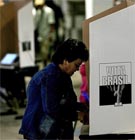Former rebel wins place in Rio mayoral run-off
 Rio de Janeiro - Former guerilla and long shot Fernando Gabeira achieved a surprise showing in Rio de Janeiro's mayoral election, winning a place in a run-off on an anti-corruption, eco-friendly platform.
Rio de Janeiro - Former guerilla and long shot Fernando Gabeira achieved a surprise showing in Rio de Janeiro's mayoral election, winning a place in a run-off on an anti-corruption, eco-friendly platform.
Gabeira, 67, of the Green Party took 25.6 per cent of the votes in Sunday's election, placing second behind Fernando Paes of the Brazilian Democratic Movement Party (PMDB) with 32 per cent, election officials said.
The leadership of the city is up for grabs as the metropolis faces rising violence at the hands of drug traffickers and militias that control the city's favelas, or slums.
Just two months ago, Gabeira had been lagging in opinion polls with 3- to 4-per cent support.
Gabeira, a former journalist and current congressman, participated in the 1969 abduction of US ambassador Charles Burke by the rebel group MR-8.
The guerillas managed to win the release of 15 political prisoners but were arrested four months later by the then-military dictatorship's secret police.
Gabeira lived in exile in the 1970s in Sweden, where he worked as a subway operator, and founded the Green Party in the 1980s upon his return to Brazil.
October 26 run-off elections are to be held to decide the mayors of three large Brazilian cities. Besides Rio, voters in Sao Paulo and Belo Horizonte must also return to the polls.
In Belo Horizonte, Marcio Lacerda of the Brazilian Socialist Party, who won 43.6 per cent of the vote, is to face the PMDB's Leonardo Quintao, who took 41.2 per cent of the ballots.
In Sao Paulo, Brazil's largest and richest city, former tourism minister Marta Suplicy, who was supported by President Luiz Inacio Lula da Silva, achieved a disappointing second place with
32.8 per cent of the votes behind the incumbent, Gilberto Kassab of the conservative Democrats with 33.6 per cent.
A defeat in the run-off for the candidate from Lula's Workers' Party would signal an end to Suplicy's hopes to succeed Lula, analysts said.
The local elections were seen as a test for Lula's government ahead of 2010 presidential elections.
A total of 128 million voters were eligible to cast ballots in more than 5,500 cities and towns in elections that were marked by stringent security measures. No significant untoward incidents were reported. (dpa)